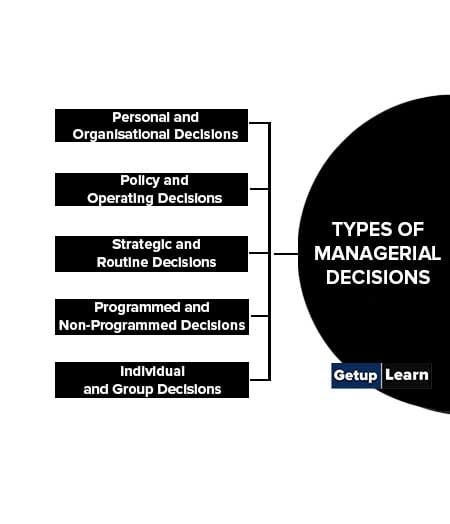
Types of Managerial Decisions
These are some of the types of managerial decisions:
- Personal and Organisational Decisions
- Policy and Operating Decisions
- Strategic and Routine Decisions
- Programmed and Non-Programmed Decisions
- Individual and Group Decisions

Personal and Organisational Decisions
A personal decision is one that a manager takes in his individual capacity and not as a member of the organization. These decisions have no binding on the organization and cannot be delegated to others.
Whereas, an organizational decision is one that a manager takes in his official capacity and on behalf of the organization. Authority with regard to such decisions can be delegated to others.
Policy and Operating Decisions
Policy decisions are of vital importance as they affect the entire organization. They are normally taken by the top management. But, operating decisions are taken for implementing policy decisions.
These decisions are taken by lower-level management. They are concerned with day to day operations of an organization.
Strategic and Routine Decisions
Strategic decisions or basic decisions are important decisions taken by the top and middle-level management. They normally involve long-term commitments. These decisions are related to the handling of the external environment which is uncontrollable.
For example, the development of a new product is a strategic decision that requires much thinking and deliberation. A mistake in such a decision will affect the entire organization.
Whereas, routine decisions or tactical decisions are of a recurring nature and affect only a small part of the organization. These decisions are taken by the lower and middle management. They are based upon well-established procedures, rules, and policies which do not require any extra effort on the part of the manager who makes these decisions.
Programmed and Non-Programmed Decisions
Programmed decisions are of a repetitive and routine nature for which specific procedures already exist in the enterprise. They do not require independent judgment on the part of the manager and they deal with only familiar problems.
They are otherwise called structured decisions. Non-programmed or unstructured decisions have no standard procedure for handling problems because they arise from unstructured problems. They deal with unexpected situations which require a great deal of imagination and independent judgment.
Individual and Group Decisions
When a decision is taken by a single person it is called an individual decision. These decisions are taken generally in small enterprises and in those enterprises which have an autocratic style of management.
Group decisions are taken by a group of persons. It is also called collective decision. Group decisions are considered better than individual decisions because two heads and always better than one.
What are the types of managerial decisions?
The following are the types of managerial decisions:
1. Personal and Organisational Decisions
2. Policy and Operating Decisions
3. Strategic and Routine Decisions
4. Programmed and Non-Programmed Decisions
5. Individual and Group Decisions.
















